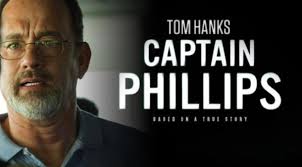The Oscar nominated movie “Captain Phillips”, based on a true story of the hijacking the cargo ship Maersk Alabama by four Somali pirates off the coast of SE Africa in 2009, tells the story about two leaders Captain Phillips (played by Academy award winner Tom Hanks) and Somali pirate captain Abduwali Muse (played by rising star Barkhad Abdi). The movie, presents their interplay, and exposes similarities and differences in their leadership style.
The leadership lessons learned stem from the films two leaders – both of whom are protagonists in their own minds – Captain Richard Phillips and Abduwali Muse.
At the very beginning of the movie Captain Phillips shows himself as a competent, responsible, selfless, servant leader who, when attacked by the pirates, puts himself in danger in order to save the crew members.
Pirate captain Muse is just the opposite – inadequate for the job, selfish, cruel and determined in fulfilling his aim, no matter of consequences. In other words a pure example of an autocratic leader. Muse is irresponsible jeopardizing the lives of his crew, which is especially visible towards the end of the movie, when confronted with action of the U.S. Anti-piracy ship. Muse refuses to surrender, even though it is the only reasonable scenario, saying fatalistically “I’ve gone too far now. I can’t go back now.”
Considering their differences and similarities, we can take out eight main lessons from these two leaders:
- Risk-taking – both captain show this leadership quality. Captain Phillips refuses to be deterred from the mission of delivering supplies despite multiple warnings of pirate attacks in the route. Muse demonstrates the same steadfast commitment to his mission: targeting the Maersk Alabama – even with the threat of military intervention. After the pirates hear Phillips making a call for armed backup (with no idea that the call is a bluff), they begin to turn around. Muse, however, responds with gusto: “What are you doing? Where are you going? Come on! Keep going!” His gusto keeps the small group of bandits moving forward.
- Listening – both captains fail to in active listening skills, generally considered one of the most important skill leader should poses. Muse refuses to listen his crew when suggesting to go back, an advice which would save their lives, and Phillips did not listen Quinn’s suggestion to leave after first day of failed attack.
- Accountability – both leaders are accountable to someone else. Muse is accountable to elders, while Captain Phillips is an employer of the cargo company.
Muse: I got bosses. They got rules.
Captain Phillips: We all got bosses.
- Responsibility – this leadership quality is expressed in different ways. Captain Phillips shows as selfless putting himself in danger, emphasizing throughout the movie to take him instead of the crew. On the other hand, Muse is selfish, doesn’t care about his crew members, e.g. when his arm was cut, his immediate response was “Just get me out of here! Give Irish the radio”. He shows lack of empathy when one of crew members was badly injured.
- Strategy & Planning – Unlike Muse, Captain Phillips knew the drill in situation of piracy attack. His crew followed his orders, and pirates were unable to locate them. Muse’s plan was lacking strategic approach, and back-up plan, assuming that things will be easy “It supposed to be easy. I take ship..ransom…nobody get hurt.”
- Flexibility – Even when the situation wheeled out of control, Phillips and his crew were able to adjust. When Phillips was taken hostage his crew decided to follow him. When their skiff sank, the pirate crew had no idea what to do and found themselves being open to Phillips and his crew’s suggestions for use of their lifeboat.
- Empowerment of followers – Phillips empowered his leaders beneath him to take action in his absence. Muse’s autocratic style did not allow for a more seamless transition of power. When Phillips was taken hostage, Shane rose up and took the lead. When Muse left to board the Navy ship, his followers were confused. While Najee did step up to command, he had difficulty getting an effective following.
- Emotional Intelligence – Both captains are very different types of leaders with Phillips demonstrating more emotional intelligence and reverent leadership style to his crew and Muse uses an autocratic style of leadership.
@majacakarun
(Group 4: Maja Cakarun, Caitlin Cruz, Rhonda Jaipaul-O’Garro, Sophia Mayberry)

